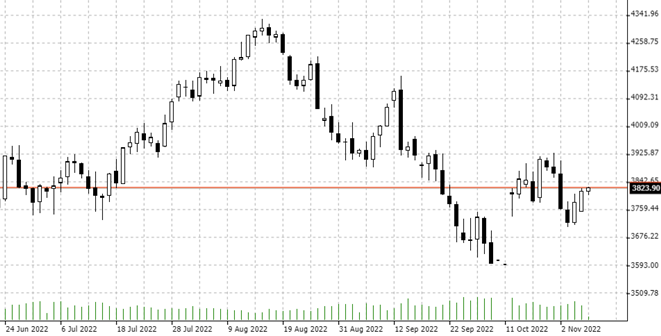

08.11.2022 – Will Republicans win the midterms convincingly or not? And how will the possible Red Wave affect Wall Street? We analyze the political situation in the USA.
There are two main issues at stake in the midterm elections: On the one hand, the question of inflation and the growing fear of impoverishment in large parts of the population. Plus the violence fueled by radical left-wing groups like Antifa and BLM amid rising conventional crime and accompanying cozying up by the judiciary in Democratic-ruled areas. Which plays into the hands of Republicans. On the other hand, the abortion issue, which draws young voters in particular to the Democrats. The one-sidedness of the mainstream media also leads votes to the Dems.

Source: Bernstein Bank GmbH
The stock market has been rather bullish lately. Pictured here is the daily chart of the S&P 500. According to most polls, Republicans will win the House of Congress by a wide margin and the Senate by a narrow margin. Incidentally, such a reversal is by no means rare in the USA.
Bonds and stocks up
Perma-bear Michael Wilson of Morgan Stanley has also recently shown himself to be increasingly in a buying mood in view of a possible Republican victory. Should the Reps win at least one chamber, this would be a possible catalyst for lower bond yields and higher stock prices – the rally in the bear market could then continue for the time being. This is because a sweep by the Reps would likely lead to a freeze in government spending and debt, which would create a buying mood in 10-year Treasuries. In tow of the Bonds, Wilson sees upside potential for the S&P 500 to 4,000/4,150, setting his stop-loss target at 3,625 to 3,650.
Rising vola on doubts
Public Policy Strategist Michael Zezas, also of Morgan Stanley, on the other hand, sees a risk of no quick result after the midterms – which would likely lead to increased volatility and provide ammunition for both bulls and bears. Vola will also rise if the Dems win unexpectedly, he said. That’s because it would mean the Democrats would throw off the shackles on inflation – and de facto work against the Federal Reserve with new government spending. Result: higher Treasury yields, stronger dollar a higher peak in the U.S. federal funds rate.
A sure victory for the Reps, on the other hand, could lead to new budget stalemates in the wake of the Budget Control Act and weigh on markets – less growth, delay in rate hikes, but then all the stronger, delayed effect. Zezas also warned against deceptive signals – just as in the previous election, it will take a while to count absentee ballots, which mostly go to the Dems.
New lows possible
And another look at history: analyst Julian Emanuel of Evercore ISI noted that after 19 midterms since 1946, stock prices have climbed. There was only one exception in 2018. But then he too provides a caveat: Uncertainty about the election outcome could weigh on stock prices. “The recent asset-market instability from politics in the UK and China” shows that short-term political risks exist, the Evercore expert wrote to clients. An unclear outcome or new allegations of election fraud could lead the S&P 500 to join the Nasdaq 100 in testing old lows. We are curious how the congressional election will turn out and keep an eye on the situation for you!
__________________________________________________________________________________________
The content of this publication is for general information purposes only. In this context, it is neither an individual investment recommendation or advice nor an offer to purchase or sell securities or other financial products. The content in question and all the information contained therein do not in any way replace individual investor- or investment-oriented advice. No reliable forecast or indication for the future is possible with respect to any presentation or information on the present or past performance of the relevant underlying assets. All information and data presented in this publication are based on reliable sources. However, Bernstein Bank does not guarantee that the information and data contained in this publication is up-to-date, correct and complete. Securities traded on the financial markets are subject to price fluctuations. A contract for difference (CFD) is also a financial instrument with leverage effect. Against this backdrop, CFD trading involves a high risk up to the point of total loss and may not be suitable for all investors. Therefore, make sure that you have fully understood all the correlating risks. If necessary, ask for independent advice. CFDs are complex instruments and are associated with the high risk of losing money quickly because of the leverage effect. 68% of retail investor accounts lose money trading CFD with this provider. You should consider whether you understand how CFD work and whether you can afford to take the high risk of losing your money.7
